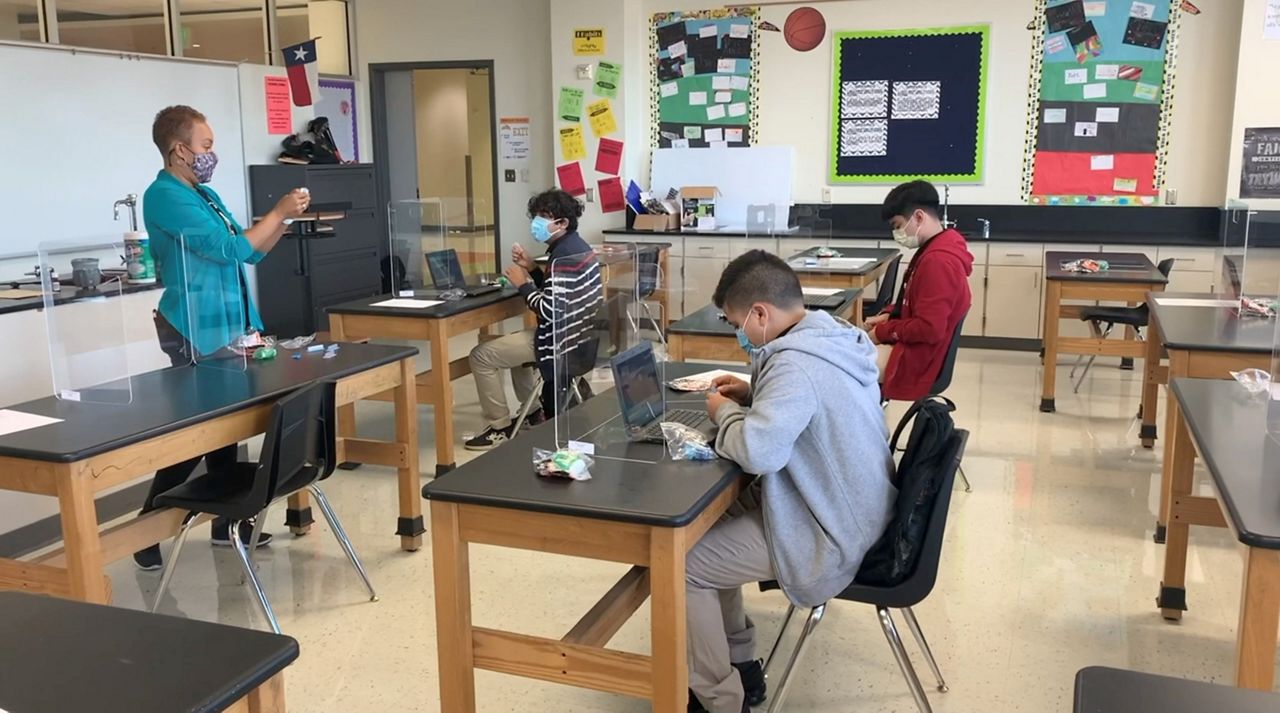DALLAS — Dallas ISD Board of Trustees voted unanimously Thursday to approve new school year calendar options for the next couple years that would allow more learning time for students who need it most.
The “intersession" calendar starts the year earlier and ends later, and adds about five weeks of classroom time throughout the year to a targeted set of students in elementary and middle school. The "school day redesign” also starts earlier and ends later, and would add 23 mandatory extra days for all students at the selected campuses. The final list of schools identified for these alternate calendars will be available in late February after more feedback of possible interest in the calendars is received. Of note, about two-thirds of students would remain on the normal, base school year calendar.
At a $100 million cost, the board's approval of these calendars is an “innovative and bold” investment to mitigate learning loss that the district says has been exacerbated by the COVID-19 pandemic. Using Measurement of Academic Progress (MAP) data, Dallas ISD found that compared to December 2019, students have experienced learning loss or a “COVID Slide” of 30% in reading and 50% in math. The switch to virtual learning has been difficult for many students, parents and teachers across Dallas ISD and school districts nationwide.
"One of our kids seems to be doing fine. She may even prefer not having quite as many distractions that she had in the classroom. The other two are really struggling, it's hard for them,” said DISD parent Rob Shearer. "Each one of their teachers has different strengths and weaknesses and is dealing with different challenges. I will say all of their teachers are having to juggle both in person and online, so they're doing that simultaneously. I'm not sure how that happens. I’m not sure how that works. But it's an extremely complicated time, clearly.”
Teachers who opt to work the intersession weeks will be able to give more targeted time and attention to their students, with an average class size of 12. There would be five dedicated days for teachers to plan and adjust classroom instruction. There will also be a possibility for students not targeted for this extra help to “opt in” to intersession time as well. Teachers will choose which of the five intersession weeks they want to work, or choose to be on vacation those weeks. Students and staff not choosing to participate in the intersession weeks would essentially have “breaks” throughout the year to “reset” before resuming core instruction. Maple Lawn Elementary Talented and Gifted K-5 teacher Angela Davis said those breaks could hinder the teacher/student relationship.
“Intercession is adding the five extra weeks in there. The issue that I see with that is that those are select students that they're going to pick to go in those things,” Davis said. “[Teachers] don't have to work it, we can be on vacation those days. But if you're trying to build a relationship with your students, and that week, they're going to have another teacher? And that time they get used to that teacher, then they're gone and then somebody else comes through. To me, that defeats the purpose of building that relationship with those students, building the relationship with the parents, getting to know them, because you can't get to know students in just one week."

Davis also said while she knows there has been a learning loss for students, switching up the calendars like this may not be such a good idea while the district is still dealing with a pandemic. She said teachers are giving 150% - 200% effort to try and make their lessons engaging, and it’s still not enough because some students are not faithfully attending class.
“If we try to something in place and the end the pandemic isn't over and we're still in a holding pattern kind of like we are now, I think it's just too much right now,” Davis said. "We really got to have time to heal from that, and then go on. It's just like, we're just moving at a fast pace as if we're not in the pandemic and everything is just business as usual. And we can't function like that. We've got to take time to just breathe, digest what's going on, and then take an objective look at where do we go from here? And what's best for your teachers,? What's best for your students? What's best for all stakeholders? Because ultimately, everyone wants the same and that's for every child to have a quality education."
Teachers and staff will not be forced into participating in either of the alternate calendars, and will be allowed to transfer to another campus, if desired. The open transfer window will be extended until early April.
“We’re not trying to force this on any school. All of them will go through the process to confirm interest from teacher, staff, and parents. And then and only then would they move to the intersession or the school day redesign calendar,” deputy chief of academics Derek Little said. “We have not heard from enough people to be able to make that decision school by school. We have to continue that engagement process. We are committed to get as close to 100% of teachers and staff and parents to weigh in on this as possible. What we at least need to have is 75 to 80% of them respond before we feel like we have enough data to make a final decision.”
The extensive feedback will continue through late February and then a final list of schools will be chosen to participate in either intersession, school day redesign, or base calendars.
